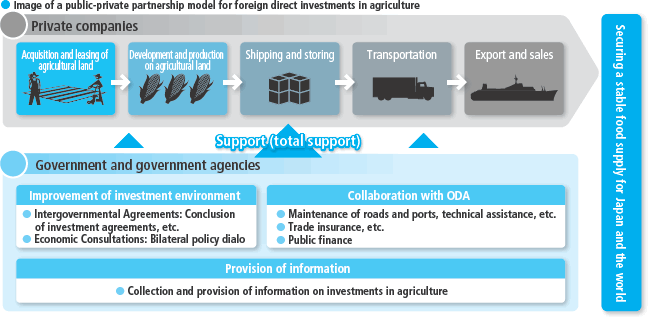Japan's Official Development Assistance White Paper 2009
Box 4 Food Security and Efforts by Japan
The Promotion of Foreign Direct Investments in Agriculture through a Public-Private Partnership Model
In 2008, the prices of food hit a historic high due to tightened food demand and supply, and the influx of speculative funds and other factors. Some of the food exporting countries imposed export restrictions in order to secure food supply in their own countries, which led to further surges in food prices. Consequently, the number of hungry people increased in many developing countries, and riots even occurred in some countries due to growing concerns of not being able to secure a sufficient food supply. Currently, food prices have declined compared to the peak levels, but they continue to fluctuate at a high level. As such, a food crisis still persists in developing countries, and the number of undernourished people in the world is expected to soon exceed one billion.
As a fundamental solution to such circumstances, the increase of food production by promoting investment in agriculture has grown in importance. The enhancement of global agricultural productivity will also lead to ensuring the stable supply of food to Japan, which relies on imports for approximately 60% of its food supply. At the same time, in recent years, while companies in food importing countries as well as American and European investors are actively making large-scale investments to farmland in developing countries, voices of criticism are being raised against this development, calling it "neo-colonialism" or "land grabs."
Investments in agriculture, international investments in particular, must be conducted in a manner where both investors and recipients can benefit. On the occasion of the G8 Summit in L'Aquila in July 2009, Japan proposed the development of principles and an international framework to promote international investment in agriculture in a responsible manner. In order to realize this, Japan has been taking initiatives in the international community, such as hosting the roundtable "Promoting Responsible International Investment in Agriculture" in association with the World Bank and the United Nations (UN) at the UN General Assembly convened in New York in September 2009.
Furthermore, Japan formulated a Guideline on the Promotion of Foreign Direct Investments (FDI) for Food Security in August 2009, and announced Japan's principles in promoting FDIs in agriculture. They include ensuring sustainable agriculture and transparency in receiving countries, complying with legislation, giving appropriate consideration to farmers and local communities, giving adequate consideration to the environment, and paying attention to the food situation in receiving countries. The Guideline encourages Japan to pursue FDIs in agriculture by comprehensively utilizing ODA to develop infrastructure for production and transportation, including the maintenance of roads and ports, as well as technology transfer and trade insurance, among others, based on the above stated principles.
The agricultural sector is not an area which can effectively draw in private capital as there are extremely high investment risks, including the possibility of export restrictions by exporting countries at times, in addition to weather risks, such as droughts and floods. Moreover, another drawback is high transportation costs as infrastructures necessary for the transportation of agricultural products are not well established in developing countries. Japan is aspiring to promote international investments in agriculture in a responsible manner under a public-private partnership model, while utilizing official assistance tools.*1
*1 Japan, as one of the world's major ODA donor countries in the agricultural sector (providing approximately 20% of the total assistance amount of OECD/DAC countries), is actively engaging in measures to increase the amount of food production and to improve the productivity of the agricultural sector in the world.
(See Section 2, Chapter 2, Part II (page 47) for details on the measures of Japan in the agricultural sector.)

